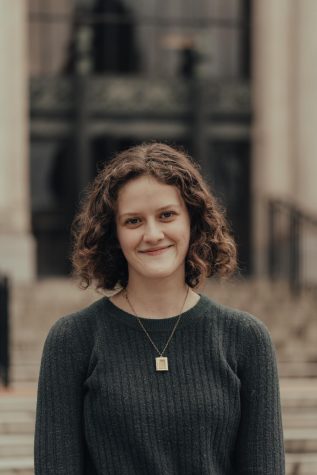Oregon continuing vaccine incentives after Benton County vaccine lottery winner announced
August 16, 2021
As the COVID-19 Delta variant spreads throughout the country, Oregon experts are continuing to turn to monetary incentive programs to boost vaccination rates.
County winners for the “Take Your Shot, Oregon” campaign were announced on Aug. 2, with Mary Downes being the winner for Benton County. Downes was unable to be reached regarding their winnings.
“Take Your Shot, Oregon,” which involved one $1 million prize, five $100,000 Oregon College Savings Plan education scholarships and 36 $10,000 prizes for each county for vaccinated Oregonians aged 12 and up, was implemented by Gov. Kate Brown’s Office, the Oregon Health Authority and the Oregon Lottery.
Matthew Shelby, the public information manager from the Oregon Lottery, said the Lottery’s role was to perform the actual draws for winners. A random number generator was used to pick vaccinated Oregonians for the prizes.
OHA, according to Shelby, had health records for those who were vaccinated and assigned a number to each record; that list of numbers was then given to the Oregon Lottery to input into their random number generator. From there, OHA matched the numbers to real Oregonians and contacted them about their winnings.
“It really allowed the state to perform a drawing that is truly random, that is auditable, that has all the secondary checks to ensure that it was actually a random draw,” Shelby said.
Oregon was inspired to create a monetary incentive program after watching Ohio’s success with a similar system. Bukhosi Dube, senior health advisor and public health physician at OHA, said Oregon was impressed by Ohio’s ability to increase vaccine uptake after the announcement of a lottery incentive program.
However, Dube said it’s difficult to tell if these incentives have had the desired effect of boosting vaccination rates, because no data was collected on individuals’ reasoning for receiving the vaccine in Oregon.
Over the summer, more monetary incentives have been used across the state to encourage citizens to get vaccinated. Gift cards are being offered to those who get their first shot, second shot and refer the vaccine to others.
“What we do know is that a lot of people are taking advantage of those incentives, and though we’re not keeping track of data as to if people are being motivated by this, what I have seen on the ground…is that people have been motivated by this, especially young folks,” Dube explained.
Benton County, according to Benton County Health Department Communications Coordinator Kelly Locey, has been using these gift cards as incentives, as well as food boxes.
“We know that it can be costly to make time or drive out of your way to get vaccinated and the intent is to help offset the cost of making time to make it to a clinic,” Locey said in an email.
Locey said monetary incentives like the lottery and gift cards have seemed to have encouraged certain individuals to get vaccinated.
“In Benton County we continue to have success providing COVID-19 vaccinations at our clinics, particularly in our rural communities,” Locey said. “This success may also be attributed to a shift in our vaccine strategies, with a focus on making vaccination as easy and convenient as possible, as well as working to build vaccine confidence.”
Shelby pointed out that the goal of these incentives has not necessarily been to encourage those who are “vehemently opposed to getting a vaccine.”
“The target audience for this particular outreach effort were folks who didn’t have anything against the vaccine…folks that just needed a little extra push,” Shelby said.
As of Aug. 10, 61.1% of Oregon’s population have received their first dose of the COVID-19 vaccine, while 56.5% are fully vaccinated, according to Our World in Data. As of Aug. 1 in Benton County, Locey said 77% of the population aged 16 and older have received at least one dose, and 63% of the total population is fully vaccinated.
Dube said another type of incentive has been Gov. Brown’s recent call for healthcare workers to be vaccinated by the end of September, or they will have to submit to weekly COVID-19 testing.
“If you’re working in healthcare, you have a lot of touch points, you have a lot of people that you interact with, and you could be spreading the virus unwillingly and unknowingly, so it’s the right thing to do,” Dube said.
Dube said the Delta variant is changing the way we deal with the pandemic. He also pointed out that Black Oregonians specifically are facing a larger challenge with the new variant; they are being hospitalized with COVID-19 at about 5.5 times the rate as White people in the state, and this is particularly a problem in the Portland Metropolitan area. According to Dube, this is due to the Delta variant as well as the fact that Black individuals in Oregon are not being vaccinated at the same rate as other groups.
“It’s now a pandemic of the vaccinated versus the unvaccinated,” Dube said. “What I’ll strongly encourage [people] to do is to get vaccinated as quickly as possible, to protect themselves, to ensure that they protect their loved ones, and to ensure that we can get back to doing things that we love doing.”












































































































